Comparative Essay: Sociological Challenges of Immigrants and Citizens
VerifiedAdded on 2022/09/13
|5
|1436
|12
Essay
AI Summary
This essay explores the challenges faced by immigrants in comparison to the lives of recognized citizens. It begins by defining globalization and its impact on migration, highlighting the struggles immigrants face in adapting to new environments. The essay's thesis focuses on the increased stress experienced by immigrants due to various barriers. These barriers include language difficulties, which affect communication and daily interactions, and employment challenges, where immigrants often face difficulties securing jobs due to citizenship requirements and workplace discrimination. The essay also addresses the challenges of securing housing and accommodation, complicated by linguistic barriers and cultural differences. Furthermore, it discusses the impact of cultural differences, prejudices, and racism, which contribute to the difficulties immigrants face in gaining acceptance and integrating into society. The essay concludes that while globalization has brought progress, immigrants continue to struggle with identity and fundamental rights in foreign countries, contrasting with the rights enjoyed by recognized citizens. The essay uses multiple sources to support its claims, emphasizing the need for understanding and addressing the unique challenges faced by immigrants.
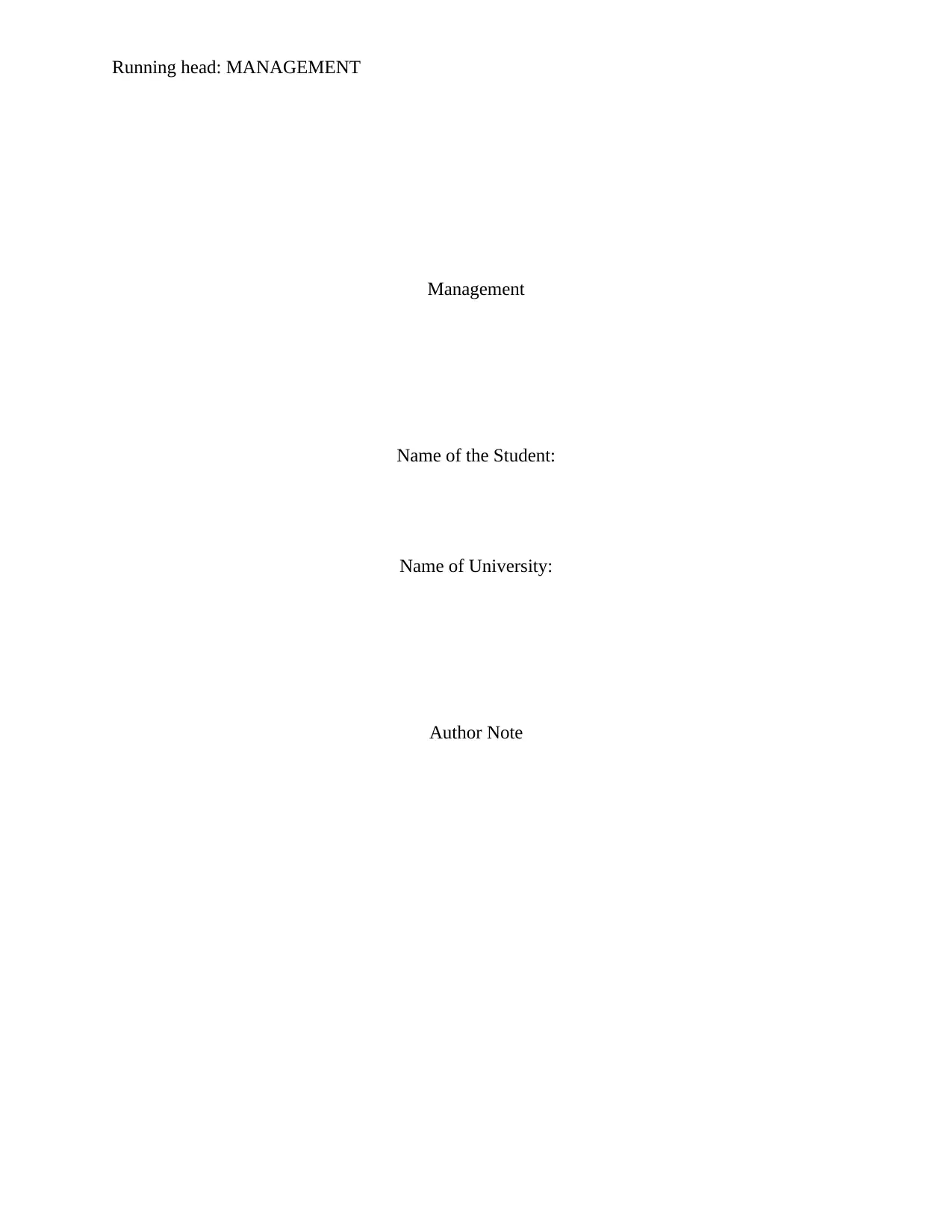
Running head: MANAGEMENT
Management
Name of the Student:
Name of University:
Author Note
Management
Name of the Student:
Name of University:
Author Note
Paraphrase This Document
Need a fresh take? Get an instant paraphrase of this document with our AI Paraphraser
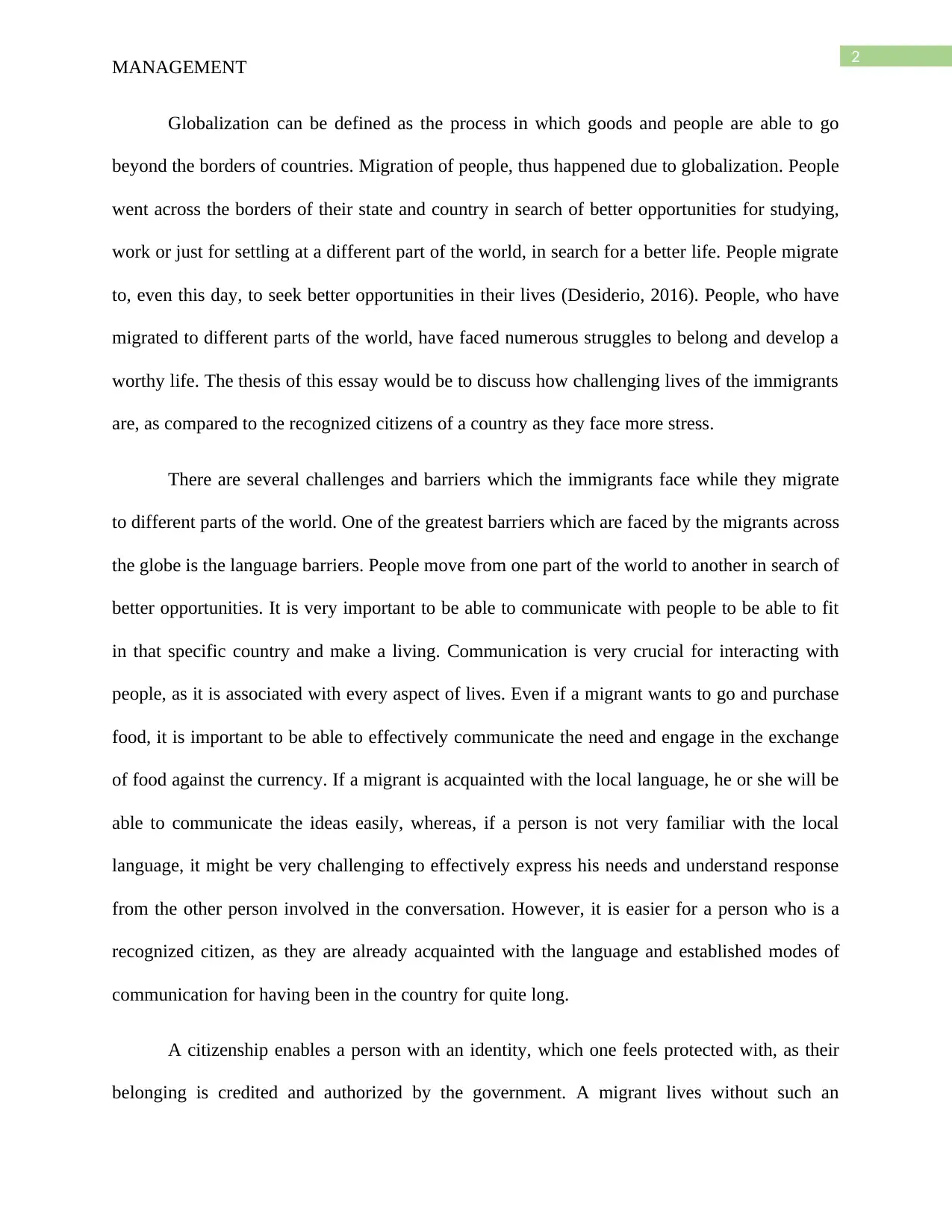
2
MANAGEMENT
Globalization can be defined as the process in which goods and people are able to go
beyond the borders of countries. Migration of people, thus happened due to globalization. People
went across the borders of their state and country in search of better opportunities for studying,
work or just for settling at a different part of the world, in search for a better life. People migrate
to, even this day, to seek better opportunities in their lives (Desiderio, 2016). People, who have
migrated to different parts of the world, have faced numerous struggles to belong and develop a
worthy life. The thesis of this essay would be to discuss how challenging lives of the immigrants
are, as compared to the recognized citizens of a country as they face more stress.
There are several challenges and barriers which the immigrants face while they migrate
to different parts of the world. One of the greatest barriers which are faced by the migrants across
the globe is the language barriers. People move from one part of the world to another in search of
better opportunities. It is very important to be able to communicate with people to be able to fit
in that specific country and make a living. Communication is very crucial for interacting with
people, as it is associated with every aspect of lives. Even if a migrant wants to go and purchase
food, it is important to be able to effectively communicate the need and engage in the exchange
of food against the currency. If a migrant is acquainted with the local language, he or she will be
able to communicate the ideas easily, whereas, if a person is not very familiar with the local
language, it might be very challenging to effectively express his needs and understand response
from the other person involved in the conversation. However, it is easier for a person who is a
recognized citizen, as they are already acquainted with the language and established modes of
communication for having been in the country for quite long.
A citizenship enables a person with an identity, which one feels protected with, as their
belonging is credited and authorized by the government. A migrant lives without such an
MANAGEMENT
Globalization can be defined as the process in which goods and people are able to go
beyond the borders of countries. Migration of people, thus happened due to globalization. People
went across the borders of their state and country in search of better opportunities for studying,
work or just for settling at a different part of the world, in search for a better life. People migrate
to, even this day, to seek better opportunities in their lives (Desiderio, 2016). People, who have
migrated to different parts of the world, have faced numerous struggles to belong and develop a
worthy life. The thesis of this essay would be to discuss how challenging lives of the immigrants
are, as compared to the recognized citizens of a country as they face more stress.
There are several challenges and barriers which the immigrants face while they migrate
to different parts of the world. One of the greatest barriers which are faced by the migrants across
the globe is the language barriers. People move from one part of the world to another in search of
better opportunities. It is very important to be able to communicate with people to be able to fit
in that specific country and make a living. Communication is very crucial for interacting with
people, as it is associated with every aspect of lives. Even if a migrant wants to go and purchase
food, it is important to be able to effectively communicate the need and engage in the exchange
of food against the currency. If a migrant is acquainted with the local language, he or she will be
able to communicate the ideas easily, whereas, if a person is not very familiar with the local
language, it might be very challenging to effectively express his needs and understand response
from the other person involved in the conversation. However, it is easier for a person who is a
recognized citizen, as they are already acquainted with the language and established modes of
communication for having been in the country for quite long.
A citizenship enables a person with an identity, which one feels protected with, as their
belonging is credited and authorized by the government. A migrant lives without such an
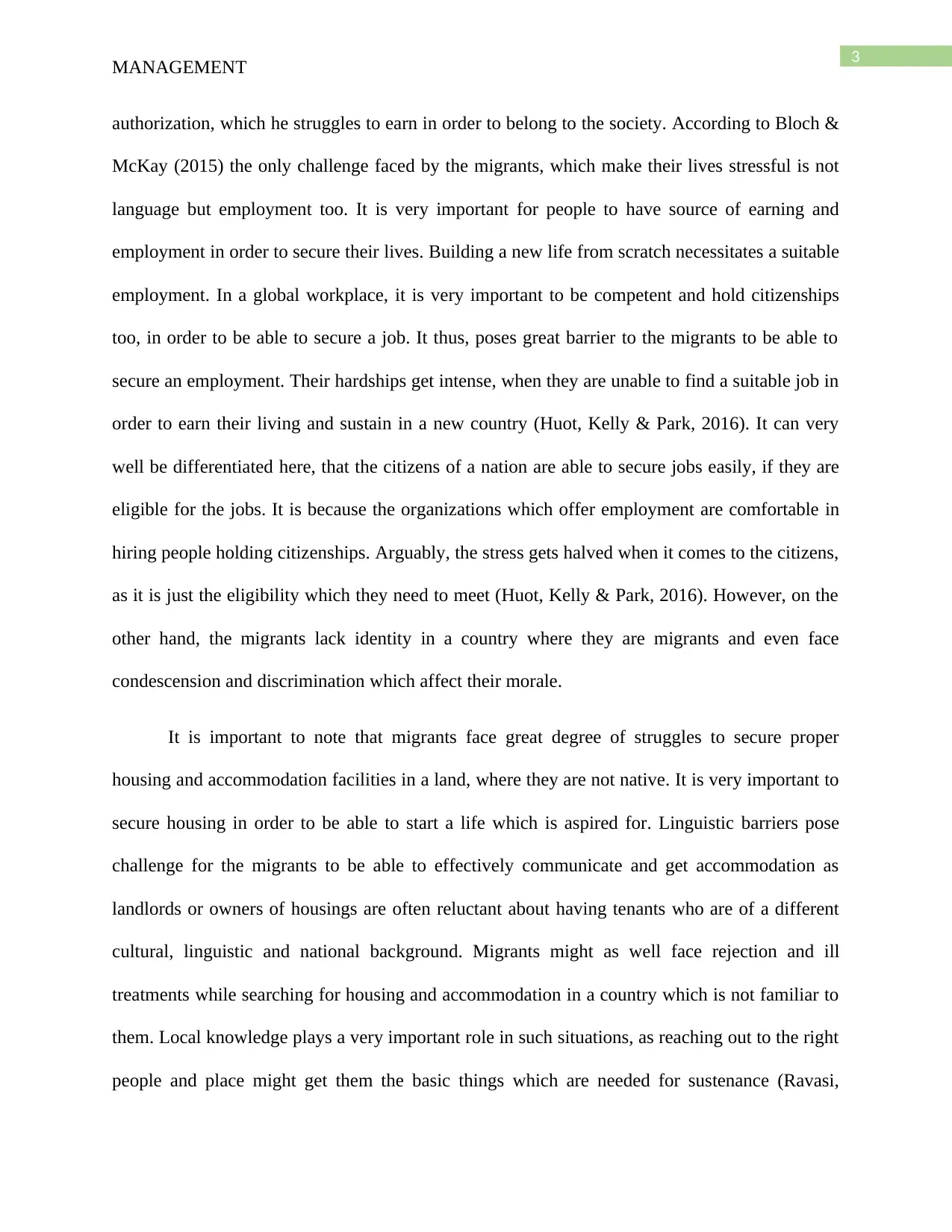
3
MANAGEMENT
authorization, which he struggles to earn in order to belong to the society. According to Bloch &
McKay (2015) the only challenge faced by the migrants, which make their lives stressful is not
language but employment too. It is very important for people to have source of earning and
employment in order to secure their lives. Building a new life from scratch necessitates a suitable
employment. In a global workplace, it is very important to be competent and hold citizenships
too, in order to be able to secure a job. It thus, poses great barrier to the migrants to be able to
secure an employment. Their hardships get intense, when they are unable to find a suitable job in
order to earn their living and sustain in a new country (Huot, Kelly & Park, 2016). It can very
well be differentiated here, that the citizens of a nation are able to secure jobs easily, if they are
eligible for the jobs. It is because the organizations which offer employment are comfortable in
hiring people holding citizenships. Arguably, the stress gets halved when it comes to the citizens,
as it is just the eligibility which they need to meet (Huot, Kelly & Park, 2016). However, on the
other hand, the migrants lack identity in a country where they are migrants and even face
condescension and discrimination which affect their morale.
It is important to note that migrants face great degree of struggles to secure proper
housing and accommodation facilities in a land, where they are not native. It is very important to
secure housing in order to be able to start a life which is aspired for. Linguistic barriers pose
challenge for the migrants to be able to effectively communicate and get accommodation as
landlords or owners of housings are often reluctant about having tenants who are of a different
cultural, linguistic and national background. Migrants might as well face rejection and ill
treatments while searching for housing and accommodation in a country which is not familiar to
them. Local knowledge plays a very important role in such situations, as reaching out to the right
people and place might get them the basic things which are needed for sustenance (Ravasi,
MANAGEMENT
authorization, which he struggles to earn in order to belong to the society. According to Bloch &
McKay (2015) the only challenge faced by the migrants, which make their lives stressful is not
language but employment too. It is very important for people to have source of earning and
employment in order to secure their lives. Building a new life from scratch necessitates a suitable
employment. In a global workplace, it is very important to be competent and hold citizenships
too, in order to be able to secure a job. It thus, poses great barrier to the migrants to be able to
secure an employment. Their hardships get intense, when they are unable to find a suitable job in
order to earn their living and sustain in a new country (Huot, Kelly & Park, 2016). It can very
well be differentiated here, that the citizens of a nation are able to secure jobs easily, if they are
eligible for the jobs. It is because the organizations which offer employment are comfortable in
hiring people holding citizenships. Arguably, the stress gets halved when it comes to the citizens,
as it is just the eligibility which they need to meet (Huot, Kelly & Park, 2016). However, on the
other hand, the migrants lack identity in a country where they are migrants and even face
condescension and discrimination which affect their morale.
It is important to note that migrants face great degree of struggles to secure proper
housing and accommodation facilities in a land, where they are not native. It is very important to
secure housing in order to be able to start a life which is aspired for. Linguistic barriers pose
challenge for the migrants to be able to effectively communicate and get accommodation as
landlords or owners of housings are often reluctant about having tenants who are of a different
cultural, linguistic and national background. Migrants might as well face rejection and ill
treatments while searching for housing and accommodation in a country which is not familiar to
them. Local knowledge plays a very important role in such situations, as reaching out to the right
people and place might get them the basic things which are needed for sustenance (Ravasi,
⊘ This is a preview!⊘
Do you want full access?
Subscribe today to unlock all pages.

Trusted by 1+ million students worldwide
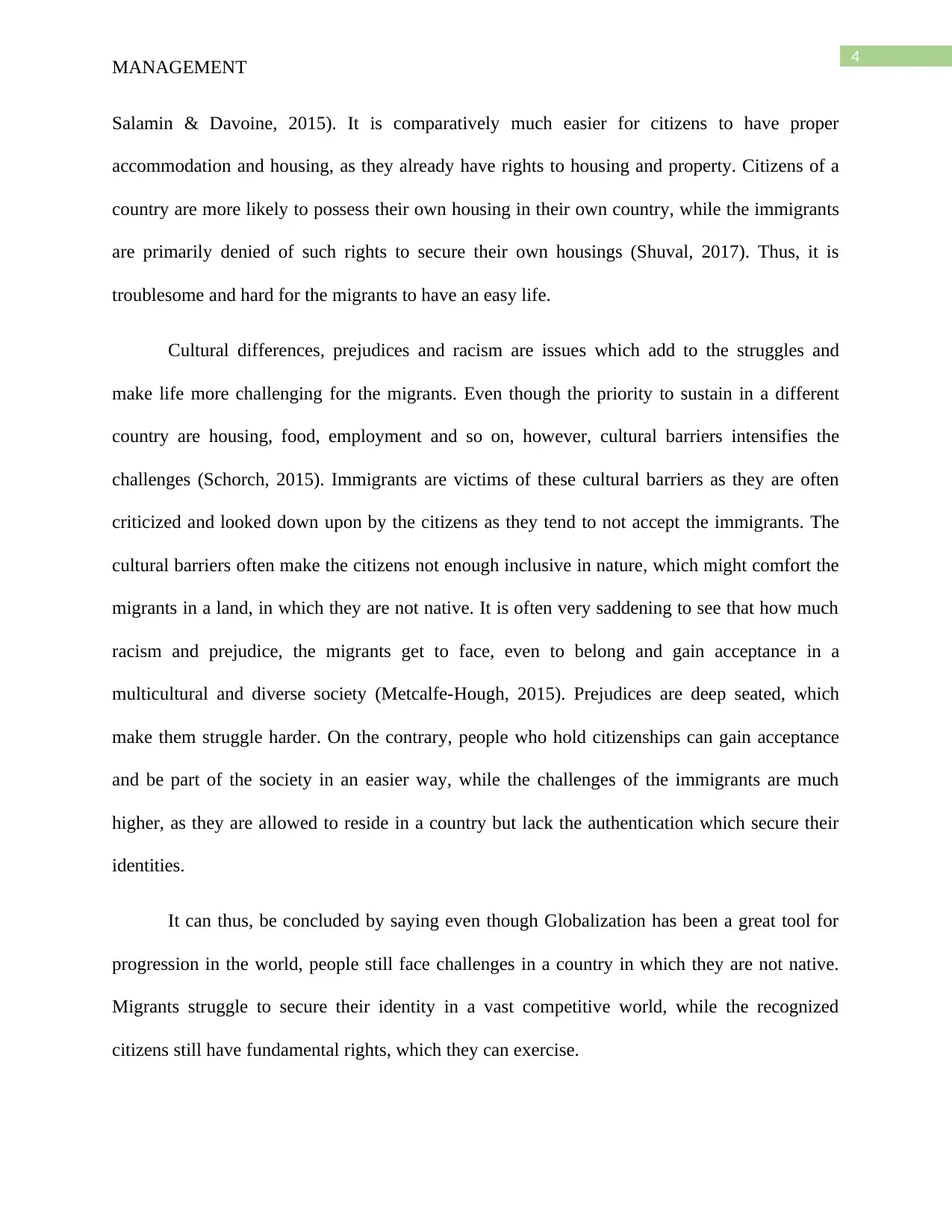
4
MANAGEMENT
Salamin & Davoine, 2015). It is comparatively much easier for citizens to have proper
accommodation and housing, as they already have rights to housing and property. Citizens of a
country are more likely to possess their own housing in their own country, while the immigrants
are primarily denied of such rights to secure their own housings (Shuval, 2017). Thus, it is
troublesome and hard for the migrants to have an easy life.
Cultural differences, prejudices and racism are issues which add to the struggles and
make life more challenging for the migrants. Even though the priority to sustain in a different
country are housing, food, employment and so on, however, cultural barriers intensifies the
challenges (Schorch, 2015). Immigrants are victims of these cultural barriers as they are often
criticized and looked down upon by the citizens as they tend to not accept the immigrants. The
cultural barriers often make the citizens not enough inclusive in nature, which might comfort the
migrants in a land, in which they are not native. It is often very saddening to see that how much
racism and prejudice, the migrants get to face, even to belong and gain acceptance in a
multicultural and diverse society (Metcalfe-Hough, 2015). Prejudices are deep seated, which
make them struggle harder. On the contrary, people who hold citizenships can gain acceptance
and be part of the society in an easier way, while the challenges of the immigrants are much
higher, as they are allowed to reside in a country but lack the authentication which secure their
identities.
It can thus, be concluded by saying even though Globalization has been a great tool for
progression in the world, people still face challenges in a country in which they are not native.
Migrants struggle to secure their identity in a vast competitive world, while the recognized
citizens still have fundamental rights, which they can exercise.
MANAGEMENT
Salamin & Davoine, 2015). It is comparatively much easier for citizens to have proper
accommodation and housing, as they already have rights to housing and property. Citizens of a
country are more likely to possess their own housing in their own country, while the immigrants
are primarily denied of such rights to secure their own housings (Shuval, 2017). Thus, it is
troublesome and hard for the migrants to have an easy life.
Cultural differences, prejudices and racism are issues which add to the struggles and
make life more challenging for the migrants. Even though the priority to sustain in a different
country are housing, food, employment and so on, however, cultural barriers intensifies the
challenges (Schorch, 2015). Immigrants are victims of these cultural barriers as they are often
criticized and looked down upon by the citizens as they tend to not accept the immigrants. The
cultural barriers often make the citizens not enough inclusive in nature, which might comfort the
migrants in a land, in which they are not native. It is often very saddening to see that how much
racism and prejudice, the migrants get to face, even to belong and gain acceptance in a
multicultural and diverse society (Metcalfe-Hough, 2015). Prejudices are deep seated, which
make them struggle harder. On the contrary, people who hold citizenships can gain acceptance
and be part of the society in an easier way, while the challenges of the immigrants are much
higher, as they are allowed to reside in a country but lack the authentication which secure their
identities.
It can thus, be concluded by saying even though Globalization has been a great tool for
progression in the world, people still face challenges in a country in which they are not native.
Migrants struggle to secure their identity in a vast competitive world, while the recognized
citizens still have fundamental rights, which they can exercise.
Paraphrase This Document
Need a fresh take? Get an instant paraphrase of this document with our AI Paraphraser
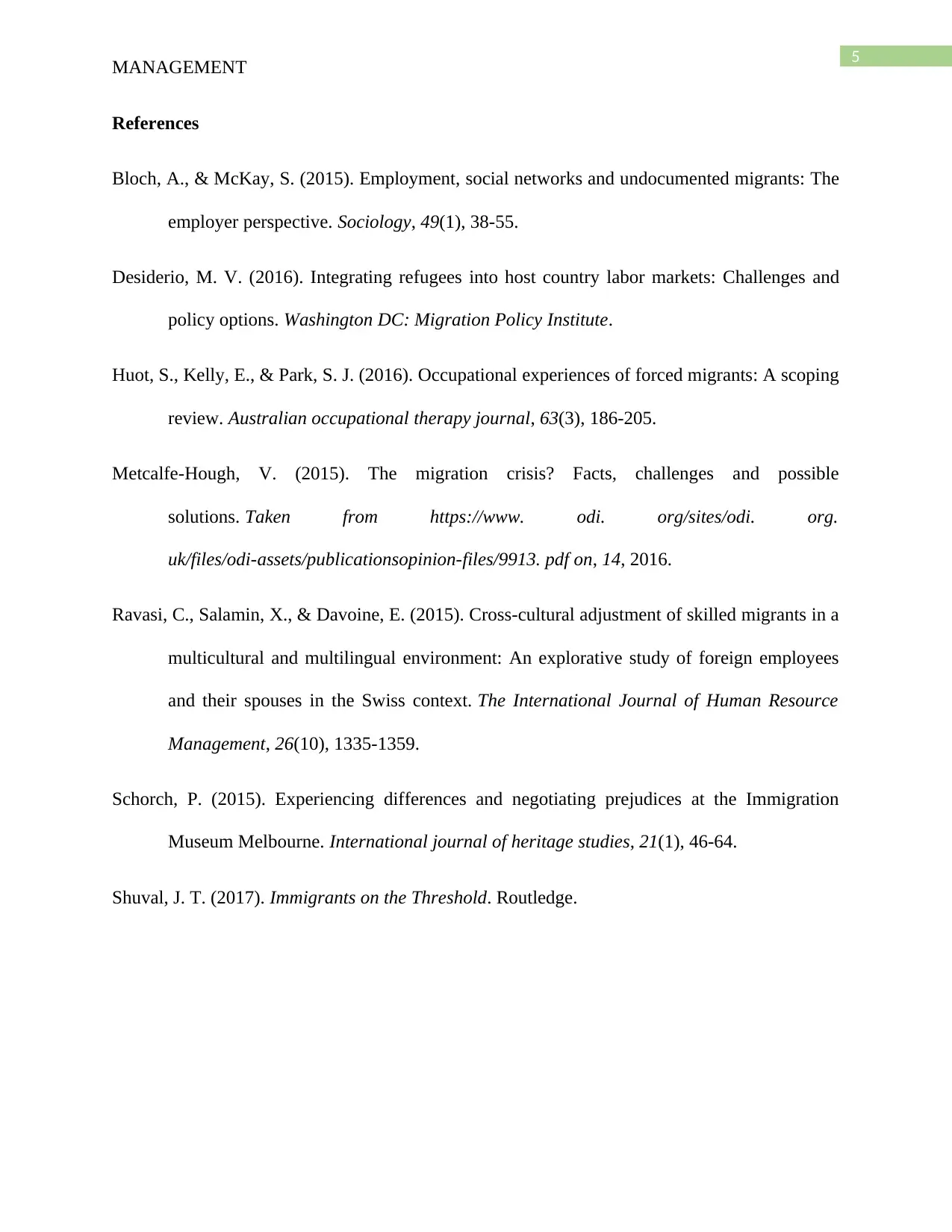
5
MANAGEMENT
References
Bloch, A., & McKay, S. (2015). Employment, social networks and undocumented migrants: The
employer perspective. Sociology, 49(1), 38-55.
Desiderio, M. V. (2016). Integrating refugees into host country labor markets: Challenges and
policy options. Washington DC: Migration Policy Institute.
Huot, S., Kelly, E., & Park, S. J. (2016). Occupational experiences of forced migrants: A scoping
review. Australian occupational therapy journal, 63(3), 186-205.
Metcalfe-Hough, V. (2015). The migration crisis? Facts, challenges and possible
solutions. Taken from https://www. odi. org/sites/odi. org.
uk/files/odi-assets/publicationsopinion-files/9913. pdf on, 14, 2016.
Ravasi, C., Salamin, X., & Davoine, E. (2015). Cross-cultural adjustment of skilled migrants in a
multicultural and multilingual environment: An explorative study of foreign employees
and their spouses in the Swiss context. The International Journal of Human Resource
Management, 26(10), 1335-1359.
Schorch, P. (2015). Experiencing differences and negotiating prejudices at the Immigration
Museum Melbourne. International journal of heritage studies, 21(1), 46-64.
Shuval, J. T. (2017). Immigrants on the Threshold. Routledge.
MANAGEMENT
References
Bloch, A., & McKay, S. (2015). Employment, social networks and undocumented migrants: The
employer perspective. Sociology, 49(1), 38-55.
Desiderio, M. V. (2016). Integrating refugees into host country labor markets: Challenges and
policy options. Washington DC: Migration Policy Institute.
Huot, S., Kelly, E., & Park, S. J. (2016). Occupational experiences of forced migrants: A scoping
review. Australian occupational therapy journal, 63(3), 186-205.
Metcalfe-Hough, V. (2015). The migration crisis? Facts, challenges and possible
solutions. Taken from https://www. odi. org/sites/odi. org.
uk/files/odi-assets/publicationsopinion-files/9913. pdf on, 14, 2016.
Ravasi, C., Salamin, X., & Davoine, E. (2015). Cross-cultural adjustment of skilled migrants in a
multicultural and multilingual environment: An explorative study of foreign employees
and their spouses in the Swiss context. The International Journal of Human Resource
Management, 26(10), 1335-1359.
Schorch, P. (2015). Experiencing differences and negotiating prejudices at the Immigration
Museum Melbourne. International journal of heritage studies, 21(1), 46-64.
Shuval, J. T. (2017). Immigrants on the Threshold. Routledge.
1 out of 5
Related Documents
Your All-in-One AI-Powered Toolkit for Academic Success.
+13062052269
info@desklib.com
Available 24*7 on WhatsApp / Email
![[object Object]](/_next/static/media/star-bottom.7253800d.svg)
Unlock your academic potential
Copyright © 2020–2026 A2Z Services. All Rights Reserved. Developed and managed by ZUCOL.





